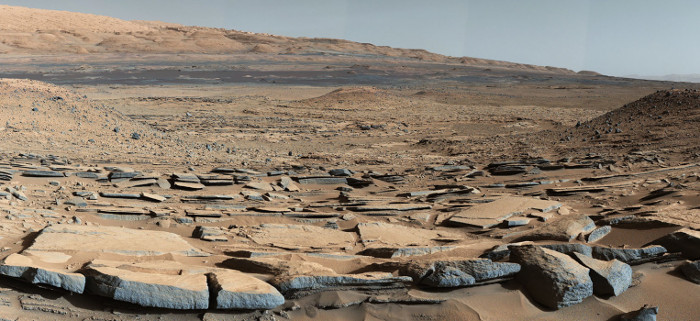NASA plans to 'eavesdrop' on Mars
NASA scientists are working hard to find and record possible sounds on Mars.
Scientists from the US Aerospace Agency (NASA) will install recording microphones into Mars Rover's self-propelled self-propelled Mars Rover .

The surface is full of rock and sand of Mars.(Source: NASA).
So far people have not known anything about the sounds that appear on the Red Planet. People hope to change this reality, when Mars Rover is launched on Mars in 2020.
So far, there have been many plans to install sound recorders on self-propelled vehicles posted on Mars but all failed, in part because of financial reasons. NASA used to install a microphone on the Phoenix Lander self-propelled car, but the device lost contact.
The plan is also not easy to implement when the atmospheric pressure on Mars is between 6 and 10 Torr units (atmospheric pressure at sea level on Earth is 735.5 units). This means that the sound will need to be much larger, the human ears or the receiver of the microphone can be recorded. It also means that the microphone will have to be very sensitive to record the sound.
Now scientists are considering the ability to use the microphone of Knowles, which has been fitted to the previous generation self-propelled cars, the Mars Polar Lander and Phoenix.
In addition to recording, the microphone will have the task of supporting collecting statistics on wind speed and studying dust at a distance close to self-propelled vehicles.
- NASA plans to bring settlers on Mars
- Details of NASA's 5-stage plan to bring people to Mars
- NASA announced plans to send people to Mars
- Want to send your name to Mars? NASA will help!
- NASA has just taken a monstrous photo that looks like a fake about Mars
- Scientists love to plant trees on Mars
- 'Martian Gardens - Martian Gardens' helps scientists find a way to grow vegetables on Mars
- China plans to conquer Mars
- NASA plans to bring unmanned aircraft to Mars
- NASA equipped lasers for Mars to explore Mars
- Why hasn't NASA brought people to Mars?
- NASA's plan to plant potatoes on Mars
 Van Allen's belt and evidence that the Apollo 11 mission to the Moon was myth
Van Allen's belt and evidence that the Apollo 11 mission to the Moon was myth The levels of civilization in the universe (Kardashev scale)
The levels of civilization in the universe (Kardashev scale) Today Mars, the sun and the Earth are aligned
Today Mars, the sun and the Earth are aligned The Amazon owner announced a secret plan to build a space base for thousands of people
The Amazon owner announced a secret plan to build a space base for thousands of people